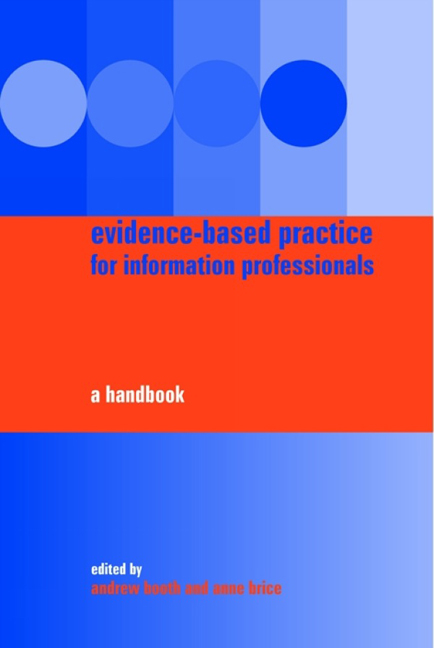Book contents
- Frontmatter
- Contents
- Foreword
- Editors and contributors
- Part 1 The context for evidence-based information practice
- Part 2 Skills and resources for evidence-based information practice
- Part 3 Using the evidence base in practice
- 13 Six domains of evidence-based information practice
- 14 Examining the evidence base for reference services and enquiry work
- Special Topic (A) Provision of a current awareness service for research staff (Guideline)
- 15 The contribution of evidence-based practice to educational activities
- Special Topic (B) How can I train my users? (Evidence Digest)
- 16 An evidence-based approach to collection management
- Special Topic (C) Electronic or paper: how do I manage my journals collection? (Evidence Digest)
- 17 Towards evidence-based management
- Special Topic (D) How do I measure the impact of my service? (Guideline)
- Special Topic (E) Should I charge and, if so, what should I charge for? (Evidence Briefing)
- 18 Evidence-based perspectives on information access and retrieval
- Special Topic (F) What are the characteristics of a good searcher? (Critically Appraised Topic)
- Special Topic (G) Which database, which interface? (Guideline) 251
- 19 Introducing an evidence-based approach to marketing and promotional activities
- Special Topic (H) Determining the information needs of practising nurses postregistration in the UK from 1990 to 2003 (Evidence Digest)
- 20 A future for evidence-based information practice?
- Index
19 - Introducing an evidence-based approach to marketing and promotional activities
from Part 3 - Using the evidence base in practice
Published online by Cambridge University Press: 08 June 2018
- Frontmatter
- Contents
- Foreword
- Editors and contributors
- Part 1 The context for evidence-based information practice
- Part 2 Skills and resources for evidence-based information practice
- Part 3 Using the evidence base in practice
- 13 Six domains of evidence-based information practice
- 14 Examining the evidence base for reference services and enquiry work
- Special Topic (A) Provision of a current awareness service for research staff (Guideline)
- 15 The contribution of evidence-based practice to educational activities
- Special Topic (B) How can I train my users? (Evidence Digest)
- 16 An evidence-based approach to collection management
- Special Topic (C) Electronic or paper: how do I manage my journals collection? (Evidence Digest)
- 17 Towards evidence-based management
- Special Topic (D) How do I measure the impact of my service? (Guideline)
- Special Topic (E) Should I charge and, if so, what should I charge for? (Evidence Briefing)
- 18 Evidence-based perspectives on information access and retrieval
- Special Topic (F) What are the characteristics of a good searcher? (Critically Appraised Topic)
- Special Topic (G) Which database, which interface? (Guideline) 251
- 19 Introducing an evidence-based approach to marketing and promotional activities
- Special Topic (H) Determining the information needs of practising nurses postregistration in the UK from 1990 to 2003 (Evidence Digest)
- 20 A future for evidence-based information practice?
- Index
Summary
After defining evidence-based marketing this chapter considers questions that those marketing their service might need to answer. After briefly considering sources that address marketing and promotion, such as business and psychological databases, it critically examines studies that have examined this area. The chapter concludes with a look at the need for complementarity of research techniques within this domain.
What is evidence-based marketing and promotion?
By marketing and promotion, Crumley and Koufogiannakis (2002) refer to the activities of ‘promoting the profession, the library and its services to both users and non-users’. In a recent article on ‘information marketing’ Rowley (2003) rehearses the following definition: ‘Marketing is the management process, which identifies, anticipates and supplies customer requirements efficiently and profitably (Chartered Institute of Marketing).’
Although the library profession generally resists the term ‘customer’, preferring ‘reader’, ‘user’ or ‘client’, the recent expansion of marketing from goods and products to services has made business analogies more acceptable. This has opened the way for the domain of marketing and promotional activities to accommodate a wider knowledge base from the business and commercial literature.
Within its wider context marketing includes affecting behaviour (Rowley, 2003) and changing attitudes. In this sense marketing occupies a niche of perennial concern for libraries as a mechanism for raising awareness of a service amongst its stakeholders. Senior managers need to be convinced that they should spend resources on information services in preference to other activities or services. A prerequisite to successful marketing is ‘premarketing’ (Booth, 2003) (i.e. the identification of users’ information needs). Hence this domain includes the information needs analysis or information (or marketing or communications) audit (Cram, 1995; Weingand, 1997).
Asking the question
As Rowley (2003) remarks: ‘The large majority of the literature on the marketing of libraries and information services is in the form of either ‘‘how to’’ guides, or case studies of practice in specific contexts. This needs to be countered by an acknowledgement that there are unanswered, and possibly unanswerable questions relating to marketing.’ This concisely highlights two key issues when applying evidence-based practice to this domain – first, the poor quality of usable literature, as already characterized in the broader, yet associated, domain of management and, second, the mismatch between questions addressed by the literature and those posed by the practitioner. Despite such an unpropitious verdict there is sufficient literature in marketing to merit consideration.
- Type
- Chapter
- Information
- Evidence-based Practice for Information ProfessionalsA Handbook, pp. 257 - 271Publisher: FacetPrint publication year: 2004
- 2
- Cited by

